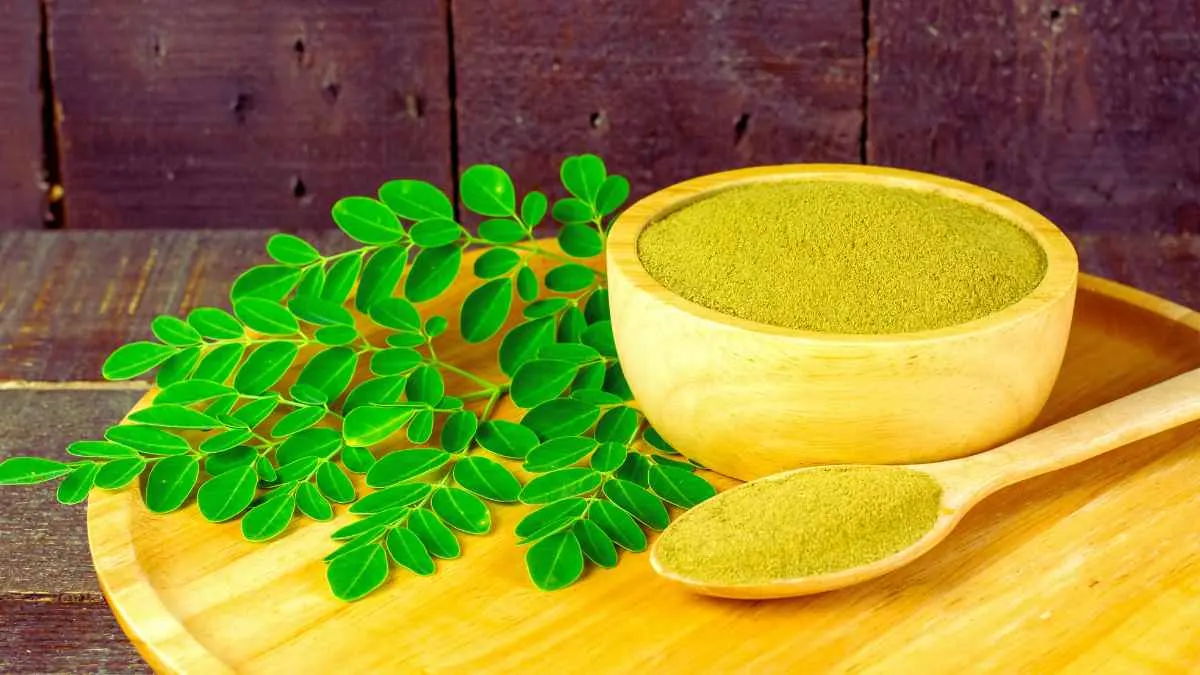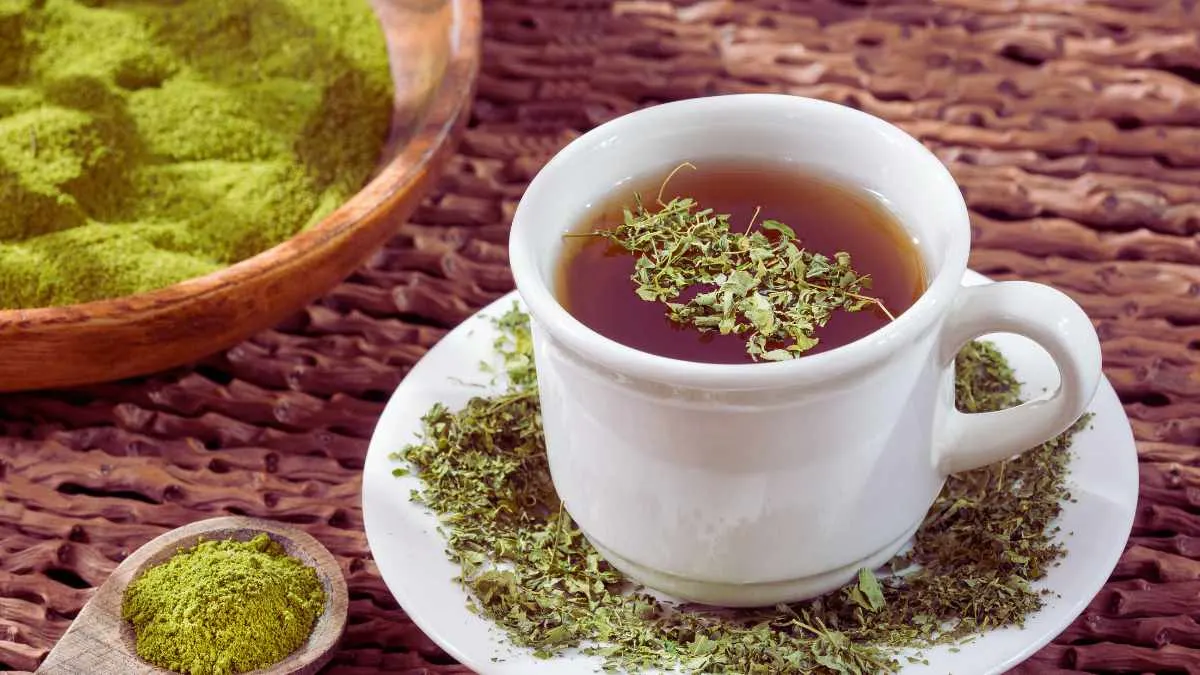Herbal teas continue to grow in popularity thanks to their unique flavors and wellness‑promoting qualities, and moringa tea is no exception.
Made from the leaves (or powder) of the Moringa oleifera tree—often called the “miracle tree”—moringa tea offers a potent mix of vitamins, minerals, antioxidants, and phytonutrients that make it a compelling addition to your daily routine.
What moringa tea is, Moringa Tea Benefits, one standout recipe you can make at home, and essential factors to keep in mind when using it.
What is Moringa Tea?
Moringa tea is an herbal infusion made by steeping dried moringa leaves (or using moringa leaf powder) in hot water. Because the moringa tree is highly nutrient‑dense, the tea derived from its leaves is considered a “superfood beverage.” Organic Life Tips+3Moringa Wellness+3Organic Facts+3
The leaves contain significant amounts of vitamins A, C, and E; minerals such as calcium, iron, potassium and magnesium; as well as plant compounds like flavonoids (quercetin, kaempferol), chlorogenic acid, and isothiocyanates. Healthline+2Organic Facts+2
Because it is naturally caffeine‑free, moringa tea can be enjoyed any time of day, making it a flexible option for those sensitive to caffeine.
Key Health Benefits of Moringa Tea:
Here are some of the most frequently cited benefits of drinking moringa tea regularly:
-
Rich in antioxidants & anti‑inflammatory compounds
The moringa leaf contains flavonoids, phenolic acids and other nutrients that fight oxidative stress. According to Healthline, moringa may help reduce oxidative stress thanks to these compounds. Healthline+1
This means drinking moringa tea may help support cellular health and reduce inflammation linked to chronic disease. -
Supports blood sugar and cholesterol levels
Emerging studies suggest moringa may help lower blood sugar and improve lipid profiles. For example, research indicates moringa leaf extracts might reduce LDL (“bad”) cholesterol and triglycerides, and help regulate glucose. Healthline+2Verywell Health+2
While most studies have used powders or extracts rather than brewed tea, the findings are promising. -
Supports heart and circulation health
Because moringa is rich in potassium, magnesium, and bioactive compounds, it may benefit cardiovascular health. The antioxidant and anti‑inflammatory profile help protect blood vessels and support healthy blood pressure levels. Organic Facts+1 -
Boosts immune system & nourishes skin/hair
Moringa’s high vitamin C, vitamin A, iron and other micronutrients support the immune system. It also contributes to skin and hair health through collagen‑supporting nutrients and antioxidant protection. Moringa Wellness+1 -
Supports digestion, energy and general wellness
Because moringa tea provides micronutrients and plant compounds, it can support digestion (via mild laxative or soothing effects), energy production (iron, B‑vitamins, magnesium) and overall wellness. Moringa Wellness
Moringa Tea Recipes | Lemon‑Ginger Moringa Tea:
Here’s a delicious and easy way to enjoy moringa tea, combining its benefits with the warming flavors of lemon and ginger.

Ingredients (makes about 1 large mug):
-
1 teaspoon moringa leaf powder or 1 heaping teaspoon dried moringa leaves
-
1½ cups hot (not boiling) filtered water (~ 90‑95 °C)
-
½ inch fresh ginger, sliced or grated
-
Juice of ½ lemon
-
1 teaspoon honey or maple syrup (optional)
-
A sprig of fresh mint (optional garnish)
Instructions:
-
Heat the water to just below boiling (~ 90‑95 °C). Using fully boiling water may make moringa taste slightly bitter. herborya.com
-
If using dried leaves: place them in a tea filter or small infuser. If using powder: add it directly to your mug.
-
Pour the hot water over the moringa leaves or powder plus the ginger. Cover and steep for 5–7 minutes.
-
Strain if needed (for leaves) and then stir in the lemon juice and honey/maple syrup to taste.
-
Garnish with a mint sprig, if desired. Serve immediately or allow to cool and drink as an iced version.
-
Optional variation: Add a pinch of turmeric or a dash of cinnamon for extra anti‑inflammatory support.
Why this works:
-
The ginger adds warm, digestive‑supportive and anti‑inflammatory properties.
-
Lemon enhances vitamin C and fresh flavour.
-
Honey/maple syrup balances the earthy taste of moringa.
-
The overall mix makes for a soothing, energising, nutrient‑rich beverage.
Essential Factors & Considerations:
When incorporating moringa tea into your routine, keep the following in mind:
Quality & sourcing
-
Choose reputable brands or sources for moringa leaves or powder; ensure they’re free from heavy‑metal contamination, pesticides, and are properly dried/stored.
-
Dried leaves tend to deliver more consistent flavor than fresh leaves, especially for tea. Clean Eating Kitchen+1
Dosage and moderation
-
While moringa is nutritious, more is not always better. Some sources recommend starting with one cup of moringa tea per day, and observing how your body responds. Moringa Wellness+1
-
As with any herbal product, balance with a varied diet rather than relying solely on one “superfood.”
Possible interactions & safety
-
Moringa may lower blood sugar and blood pressure. If you are on medication for diabetes or hypertension, consult your healthcare provider before using moringa tea regularly. Your Tea Guide
-
Limited research exists on the safety of moringa tea during pregnancy or breastfeeding; some reports suggest caution. Healthline+1
-
Large amounts may cause digestive upset in some individuals (gas, laxative effect). Organic Facts
Flavor profile & how to enjoy
-
Moringa tea has a mild, earthy, slightly green‑tea like flavor. Some may find it more enjoyable when paired with lemon, ginger, honey, or mint. herborya.com+1
-
You can enjoy it hot or chilled (iced moringa tea works well in warm weather).
-
It pairs well with meals, or as a gentle pick‑me‑up mid‑afternoon.
Integrating into your lifestyle
-
Use moringa tea as part of a holistic wellness plan: balanced diet (vegetables, lean protein, whole grains), regular physical activity, sufficient sleep and stress‑management.
-
Drinking a single cup of moringa tea won’t replace good lifestyle habits—but it can complement them.
Read Next: Hibiscus Tea Benefits | The Powerful Drink for Heart Health & Immunity
Last call:
Moringa tea offers a potent blend of nutrition, antioxidants and wellness‑supporting phytochemicals in a caffeine‑free, easy‑to‑make form. Though it’s important to note that many human studies are still limited. Verywell Health+1
The Lemon‑Ginger Moringa Tea is an excellent recipe to get started: simple, flavorful and health‑conscious.
As with any supplement or herbal beverage, quality sourcing, moderate use and medical consultation (especially if you have existing health conditions) are key.
Moringa tea into your routine alongside a healthy lifestyle, you give your body one more nutrient‑rich tool in the wellness toolkit.

